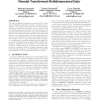Free Online Productivity Tools
i2Speak
i2Symbol
i2OCR
iTex2Img
iWeb2Print
iWeb2Shot
i2Type
iPdf2Split
iPdf2Merge
i2Bopomofo
i2Arabic
i2Style
i2Image
i2PDF
iLatex2Rtf
Sci2ools
189
click to vote
SIGMOD
2005
ACM
2005
ACM
SHIFT-SPLIT: I/O Efficient Maintenance of Wavelet-Transformed Multidimensional Data
The Discrete Wavelet Transform is a proven tool for a wide range of database applications. However, despite broad acceptance, some of its properties have not been fully explored and thus not exploited, particularly for two common forms of multidimensional decomposition. We introduce two novel operations for wavelet transformed data, termed SHIFT and SPLIT, based on the properties of wavelet trees, which work directly in the wavelet domain. We demonstrate their significance and usefulness by analytically proving six important results in four common data maintenance scenarios, i.e., transformation of massive datasets, appending data, approximation of data streams and partial data reconstruction, leading to significant I/O cost reduction in all cases. Furthermore, we show how these operations can be further improved in combination with the optimal coefficient-to-diskblock allocation strategy. Our exhaustive set of empirical experiments with real-world datasets verifies our claims.
| Added | 08 Dec 2009 |
| Updated | 08 Dec 2009 |
| Type | Conference |
| Year | 2005 |
| Where | SIGMOD |
| Authors | Mehrdad Jahangiri, Dimitris Sacharidis, Cyrus Shahabi |
Comments (0)

